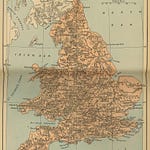The author of our Poem of the Week, Henry Vaughan, was a young Welshman writing devotional lyrics in English, at just the time when everybody in England was in a fury of political and ecclesiastical zeal. The year 1650 wasn’t a promising one for such a poet, and surely not one with Vaughan’s royalist sympathies. King Charles I had just been executed the year before, and no one was on the throne; power had passed into the hands of Oliver Cromwell, whom our friends in Ireland must love as little as the people of Georgia loved William Sherman as he burned his broad swath from Atlanta to the sea. Vaughan was pretty much ignored at the time. But ever since the Victorian age, people began to value again the lyric inventiveness and the artistic precision of such religious poets as Vaughan and the man he names as his master, George Herbert, whom we’ve often featured here at Word and Song. Of the two, I think Herbert is the greater genius, but I hope you’ll see that there’s something quite appealing in Vaughan’s more direct address and simpler style.
Today’s poem comes from the first edition of his book of religious lyrics, Silex Scintillans. “What the heck does that mean?” you ask. Well, silex is the Latin word for flint — think of our scientific term silicon, coined in 1817 by the British chemist who discovered the element in its pure form. As for scintillans, you can guess that it has to do with light: Latin scintilla is a spark. Now, a chunk of flint is not going to spark by itself. It has to be struck, hard — perhaps hard enough to shear it, and that’s why Vaughan chose those words for his title. He says that only the Lord could have taken his cold heart and bring it to life, by force. “My cheeks are wet,” he says in his dedicatory page, “with tears wrung from flint.” His health at the time was poor, and his younger brother had died two years before, and, as I’ve said, England was a raging battlefield. But Vaughan was pierced to the heart, and the poems he wrote then, he says, are the fruits of Christ’s own passion and death for him.
Anybody, I guess, can look at the death of Jesus on the cross and be moved to indignation at the execution of a good and innocent man. But if that’s as far as it goes, Vaughan would remind us, that doesn’t come near to fathoming the depths of his sacrifice. Plenty of fairly decent and more or less innocent people have died unjustly. Here we need the gospel writers and the first Christians and the ancient Fathers to remind us that we are talking about the Son of God himself. It isn’t just that Jesus was better than we are. He is the image of the invisible God. He is the Alpha and the Omega. He is the bright Morning Star that never sets. The great wonder was not that people rejected him. What would we expect sinful men to do? The great wonder, as Vaughan saw, was that God would dwell among us in the flesh in the first place, disrobing himself of his majesty, and taking on the robes of mortality, and all the limitations and the sorrows of this life.
So it is that we ought to see Christmas and Holy Week and Easter all together. The wood of the manger looks forward to the wood of the Cross; the stable, most likely a cave or a dugout burrowed into a rocky hillside, looks forward to the tomb. But of course, the Cross is not the end, nor the tomb, and that’s why Christians could sing yesterday’s hymn, The Royal Banners Forward Go, with such passion and solemn joy. Love is the secret that is in plain sight: but we want love to be as we choose, and not as it is.
Vaughan has the words of Saint Paul in mind. Who wants to die in place of someone else — not your child, not even your brother or sister? Well, says Paul, you might die for the sake of a very good man; outside of the field of battle, which is another matter entirely, it’s hardly likely. But Christ died, as Vaughan puts it, “for those that kill thee every day.” For man the ungrateful, slow to hear, stiff in the knees, muddled in the brain, fickle at heart. Even had there been no Cross, his Incarnation was an infinite humbling, on behalf of mortal man whom he would raise up to life. Think of that unbridgeable chasm between the absolute God, and dust. Nothing but Love himself can be the bridge. Then think of the chasm between eternal life, and death. There is no other bridge for that, either.
Lord! when thou didst thyself undress, Laying by thy robes of glory, To make us more, thou wouldst be less, And becam'st a woeful story. To put on clouds instead of light And clothe the morning star with dust, Was a translation of such height As, but in thee, was ne'er expressed. Brave worms, and Earth! that thus could have A God enclosed within your cell, Your Maker pent up in a grave, Life locked in death, heaven in a shell; Ah, my dear Lord! what couldst thou spy In this impure, rebellious clay, That made thee thus resolve to die For those that kill thee every day? O what strange wonders could thee move To slight thy precious blood and breath! Sure it was Love, my Lord; for Love Is only stronger far than death.
Listen to this episode with a 7-day free trial
Subscribe to Word & Song by Anthony Esolen to listen to this post and get 7 days of free access to the full post archives.













